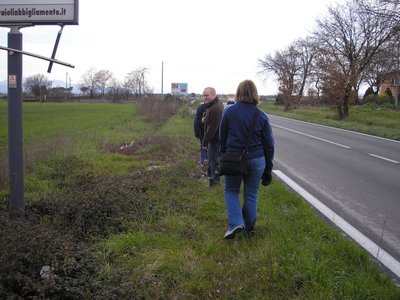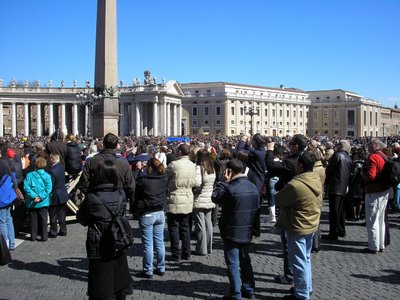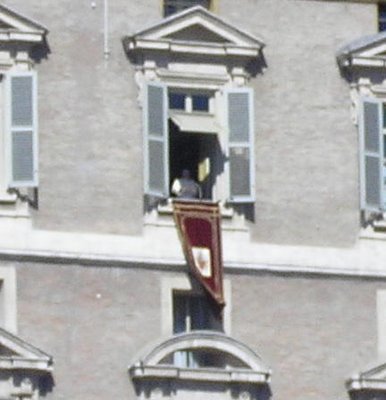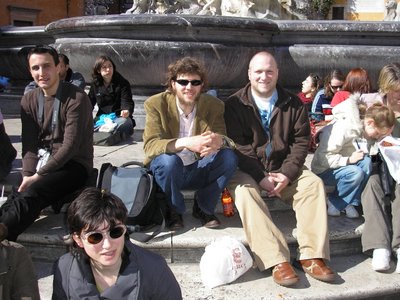I had the most surreal experience today. I was on my way down to a library by St. Peter’s to do some work, and I was reading a book about medieval church history on the bus on the way down. The particular section was about the period beginning in the mid-11th century in which the papacy began to develop and consolidate its theory (and practice) of absolute papal sovereignty. Here, some of the major outlines of the type of papal power with which most moderns are most familiar started to take shape and to be drawn more sharply. Upon exiting the bus, I was walking down some side streets to get to the library when I heard a voice chanting over a PA system. So I followed the voice. Lo and behold, I had stumbled into the middle of the ceremony in St. Peter’s Square in which new cardinals were being created. It was like stepping back into the Middle Ages, except that everyone was wearing waterproof jackets and carrying digital cameras.
A guard outside the square let me in, so I decided to play hooky and watch for a while, figuring this was a once-in-a-lifetime opportunity. A good part of the service was in Latin, albeit with ecclesiastical pronunciation, so I decided it wasn’t a total loss for work. The whole college of cardinals (as far as I could tell) was on the platform in front of the basilica, and it was the first time I’d seen the pope in person regaled in vestments that were not plain white. The coolest part of the ceremony to my mind was the consecration of a cardinal in a wheelchair, whom they had to carry up the steps (reminding me a little of the story of the paralytic in Mark 1:1-12 in which the man’s friends lower him through the roof where Christ is preaching); instead of the man bowing down before the pope as all of the other cardinals-to-be had done, the pope stood up and came to him, and this was as it should be for the servus servorum Dei. May we all take it as an example (a visual metaphor, as it were) of going to serve where there is need.
One other thing I noticed: the pope keeps a handkerchief shoved in the left sleeve of his robe. This strikes me as an incredibly good idea. I’d never thought about the lack of pockets in their vestments, and this is a solution to the problem I applaud as someone who likes to carry a handkerchief at all times.
Oh, and I think I almost got on Italian TV, except that when the woman queried in Italian something to the effect of whether she could ask me some questions about the ceremony, I kind of looked at her and said, ‘Scusi?’ The gig was up at that point, and she and her camera-woman were off to find more promising quarry.
And one more note of interest (at least to me). Last Sunday morning when Kirk and I were at St. Peter's, I noticed that during communion the choir was singing
'Ah, Holy Jesus'. I thought this was interesting, because this hymn is an English translation of the German hymn 'Herzliebster Jesu', written by Johann Heerman, who was (among other things)
a Lutheran pastor. Moreover, the hymn's music is by Johann Crueger, who
studied theology at Wittenberg, Martin Luther's old stomping ground. Needless to say, it was odd and surprising to hear a German Protestant hymn at a crucial point in the high Latin mass in the sanctuary of St. Peter's, the nerve-center of all of Roman Catholicism. Perhaps a little
rapprochement is on the horizon?
PostscriptHere are the Enlish lyrics they were singing:
Ah, holy Jesus, how hast Thou offended,
That man to judge Thee hath in hate pretended?
By foes derided, by Thine own rejected,
O most afflicted.
Who was the guilty? Who brought this upon Thee?
Alas, my treason, Jesus, hath undone Thee.
’Twas I, Lord, Jesus, I it was denied Thee!
I crucified Thee.
Lo, the Good Shepherd for the sheep is offered;
The slave hath sinned, and the Son hath suffered;
For man’s atonement, while he nothing heedeth,
God intercedeth.
For me, kind Jesus, was Thy incarnation,
Thy mortal sorrow, and Thy life’s oblation;
Thy death of anguish and Thy bitter passion,
For my salvation.
Therefore, kind Jesus, since I cannot pay Thee,
I do adore Thee, and will ever pray Thee,
Think on Thy pity and Thy love unswerving,
Not my deserving.
As you can see, five verses. The German version, on the other hand,
has fifteen.


































